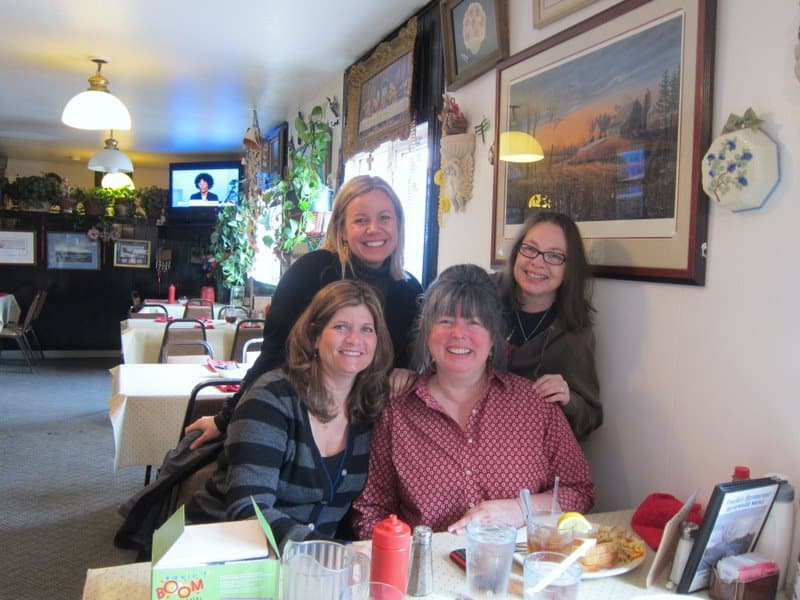MED-EL
Published May 11, 2016 | Last Update Feb 23, 2023
What to Tell Friends and Family about Your Hearing Loss

Here are some tips from Tammy, who received bilateral cochlear implants to treat her sensorineural hearing loss. She’s had support from friends and family, and has lots of information about what you can tell your friends and family.
Tammy’s Hearing Loss
It’s likely an autoimmune inner ear disease caused my sensorineural hearing loss, and only a few months after my diagnosis I received a hearing aid. Then over the next six years I continued to lose my hearing until a very stressful September in 2014 lead me to lose a huge chunk of what hearing I had remaining. Hearing aids were no longer helpful and I knew I needed to do something—and that something was cochlear implants.
There was never any thought that I would get a cochlear implant in only one ear. They were both bad. My doctor and audiologist were both very supportive, but I was uncertain what would happen after my implantation and activation. While I was excited about the possibilities, I kept my expectations pretty low since I had already been struggling for so long. A person can never know what their outcomes would be, even after reading about all the great success stories, so I didn’t want to be greatly disappointed.
I can tell you my outcome has been awesome! My hearing is so much better than it was with hearing aids and I’ve had my cochlear implants barely over a year. It’s not perfect, but I know there will be continued improvement.
Changes Due to Hearing Loss
My life changed drastically; from being very involved in community, school, and social activities, to becoming isolated and dreading any kind of social interaction. I had some folks drop away from my life due to the hearing loss. It was also hard on my kids, since they had to often repeat themselves and they would tell me “never mind” instead of repeating themselves for the third or fourth time.
That was one the hardest parts; asking people to repeat themselves and feeling like it was burdensome to talk with.
I think that most of my family and friends didn’t really know what to do when I started my hearing loss journey. It surprised them as much as it did me. With the other health issues that came along with it, and the lack of specialized care in my community, no one really knew what to do.
Getting a Cochlear Implant
I had to travel from Alaska to Seattle to have my surgery, and my friends and family were so supportive and encouraging. My husband took off work during the busy fishing season, my in-laws took care of me and my husband while we were in Seattle, my friend’s daughter came to the hospital and stayed all day even though I told her she did not have to take off work to do so, and my son and his girlfriend came for my surgery.
After my surgery people were excited. They could see how much my implants were helping me to hear again, and they were thrilled for me. I also think they are in just as much awe over the technology—”miracle”—as I was. Most people don’t know about cochlear implants and they are interested to know about them and how they work.
What Friends and Family Can Do
While I was excited about the possibilities along with everyone else, I made sure to educate as many of my close friends and family as much as possible. I told them this would be a continuation of my journey, and I wasn’t suddenly going to have normal hearing when they flipped the switch. I was going to have some struggles and adjustments as my brain and ears worked out this new way of hearing. Because of this they were all pretty grounded in their expectations, I think.
I think the biggest thing I appreciate is that those closest to me know that I still need some visual cues in noisy environments or with certain voices. People I know are very, very patient with the limitations I can still have at times. They will repeat what they said, spell a word I need help understanding as they are speaking, or even write things down.
I mostly try not to let any well-intentioned, but unhelpful, things bother me. People try to do their best and they can only do what they know. So if I can give them information that will help them help me, I will. I mostly find it difficult when people insist on calling me even when I request email or text because the phone is still difficult for me. An example would be standing at the airline counter after my flight was cancelled due to weather; they keep telling me to call reservations for my new flight, and I keep telling them I don’t hear well on the phone because I am deaf and have cochlear implants, and they look at me like I am crazy because I do not “look or sound” deaf.
My fellow school board members are very accommodating during meetings and will speak up and repeat anything when I request them to. They are very kind and considerate. I love it when people have a sense of humor when I am completely off the mark about what was said—and sometimes I can be WAY off.
Also, my husband Jack has been so supportive, accommodating, encouraging, and just plain patient. He looks for ways to make anything I am struggling with easier. He knows that it is hard for me to have a conversation while playing Scrabble if the CD player is going, so he turns the CD player off even though he loves music. It’s just the little things like that which help me out.
Thanks, Tammy!
MED-EL
Was this article helpful?
Thanks for your feedback.
Sign up for newsletter below for more.
Thanks for your feedback.
Please leave your message below.
Thanks for your message. We will reply as soon as possible.
Send us a message
Field is required
John Doe
Field is required
name@mail.com
Field is required
What do you think?
MED-EL


